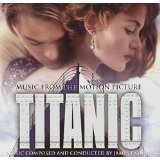23 June 2015
Titantic Composer James Horner Dies in Plane Crash
Academy Award-winning music composer James Horner has been killed in a plane crash.
Horner won two Oscars for the movie Titanic - one for its theme song My Heart Will Go On, performed by Celine Dion, and another for the film's score.
He received Oscar nominations for his music in Apollo 13, Braveheart, Field of Dreams, Aliens and Avatar.
Horner, who was 61 years old, died when his single-engine plane crashed Monday about 160 kilometers northwest of Los Angeles. No one else was on board the plane.
Horner's scores carried films to their climax and accompanied top actors as they delivered some of their most moving performances.
Tender kisses in The Amazing Spider-Man, grand battles in Troy and moments of stirring drama in A Beautiful Mind were set up by Horner's compositions.
American film hits of the 1990s, such as Patriot Games, Searching for Bobby Fischer and Jumanji also were composed by Horner. In addition, he scored popular animated films The Land Before Time (1988) and An American Tail: Fievel Goes West (1991).
Horner was nominated for an Oscar for the song Somewhere Out There in An American Tail.
Top actors and directors in the film and television world paid tribute to Horner online. Academy Award winning director Ron Howard wrote on Twitter, "Brilliant Composer James Horner, friend & collaborator on seven movies has tragically died in a plane crash. My heart aches for his loved ones."
11 June 2015
Jazz Icon Ornette Coleman Dies at 85
by Diaa Bekheet
Legendary saxophonist and composer Ornette Coleman died in Manhattan Thursday morning at the age of 85. His publicist declined to give further details about the cause of death but some media reports say the icon of "Free Jazz" died of cardiac arrest.
Coleman's album "Change of the Century" ushered in a new jazz style in the late 1950s, that later became known as “Free Jazz” - featuring songs that break the traditional rules of melody allowing musicians more latitude to go beyond the limitations of bebop and modal jazz.
The world first learned of Free Jazz in 1959 when the alto saxophonist walked into a Hollywood music studio with bassist Charlie Haden, drummer Billy Higgins and pocket trumpeter Don Cherry. The quartet recorded "Change of the Century," which produced its most famous song: “Ramblin.”
For the Coleman quartet, it was all exciting, new music. They didn’t want to sound like other traditional jazz players of the time, and sought a greater sense of freedom. Coleman considered sound an invisible emotion combining various moods.
His first album, "The Shape of Jazz to Come," laid the foundation for “Free Jazz.” Many musicians and jazz lovers alike were shocked that the songs had no recognizable chord structure but contained free-style simultaneous improvisation.
“Ornette shocked the American jazz world," says jazz writer Howard Mandell. “Here was somebody who was completely upsetting the apple cart. And pissing off Mingus and Max Roach – who, I think – they believed that they were going to be the Next Big Thing. And all of a sudden here comes this guy who’s, like, doesn’t talk like anyone. He doesn’t act like anyone. And man, he is making a sound that is raising peoples' consciousness!”
“It puzzles me today why people were puzzled by that record," he continued. "It’s so melodic. And it’s so interactive, and the song forms are slightly unusual, but they’re nothing disturbing. So I’ve never understood why that record was considered so radical.”
But people were puzzled nonetheless. So much so, Mandell says, that some even wondered whether Ornette Coleman was for real.
“Many listeners/critics were very admiring of Ornette’s sound and his idealism," he said. "But other people thought that this – he was a charlatan -- a con man."
Some were disappointed, but Coleman believed that jazz must be free.
“The theme you play at the start of a number is the territory,” he explained in a documentary about Free Jazz. “And what comes after, which may have very little to do with it, is the adventure.”
"The Shape of Jazz to Come," was ranked number 246 on Rolling Stone magazine's 2003 list of the 500 greatest albums of all time.
Coleman had lots of fans in Europe. In addition to performing at the prestigious Montreux Jazz Festival in Switzerland, he was the artistic director of the 16th annual Meltdown festival in London’s Southbank Center.
In 2007, Coleman received a Grammy award for Lifetime Achievement and a Pulitzer Prize in the music category for “Sound Grammar” - making him only the second jazz composer to ever win a Pulitzer.
Richard Paul contributed to this report.
Subscribe to:
Comments (Atom)

